The best destinations for nightlife in Europe
Discover the best nightlife destinations in Europe: Berlin, Ibiza, Prague, and more. Legendary clubs, trendy bars, and unforgettable parties are waiting for you!
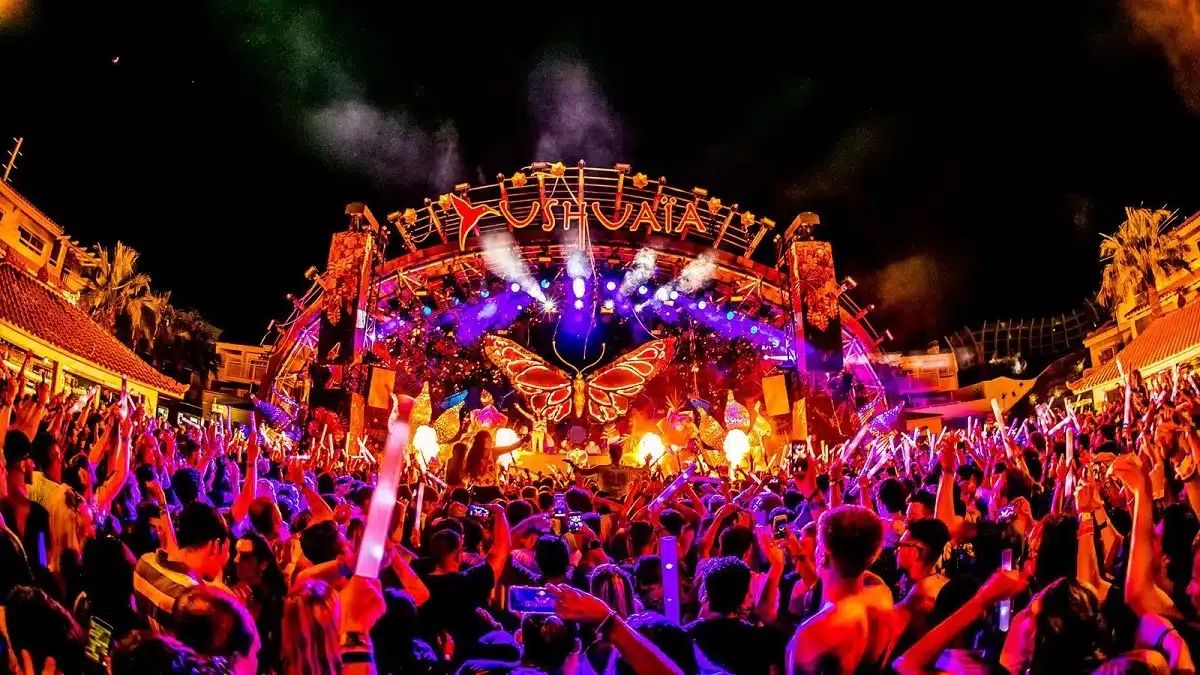 Ibiza Ushuaia Party.webp (source: voyagesautenteo.com)
Ibiza Ushuaia Party.webp (source: voyagesautenteo.com)Why is Europe an Essential Destination for Nightlife?
Europe shines like a beacon for party lovers from around the world. This continent is filled with iconic cities where night transforms streets into veritable theaters of festivities. From historic capitals with underground atmospheres to Mediterranean islands with legendary clubs, the old continent offers an incomparable diversity of nocturnal experiences.
What distinguishes the European nightlife scene? The richness of its contrasts. From Berlin's converted industrial warehouses to Budapest's ruin bars, each destination cultivates its own festive identity, the fruit of a unique cultural history. In recent years, trends have evolved toward more immersive experiences and innovative concepts, such as pop-up clubs, themed parties, and urban festivals that constantly redefine the art of celebration.
Ready to embark on a nocturnal journey through Europe's most festive destinations? Fasten your seatbelts, the night is just beginning!
Berlin: World Capital of Techno
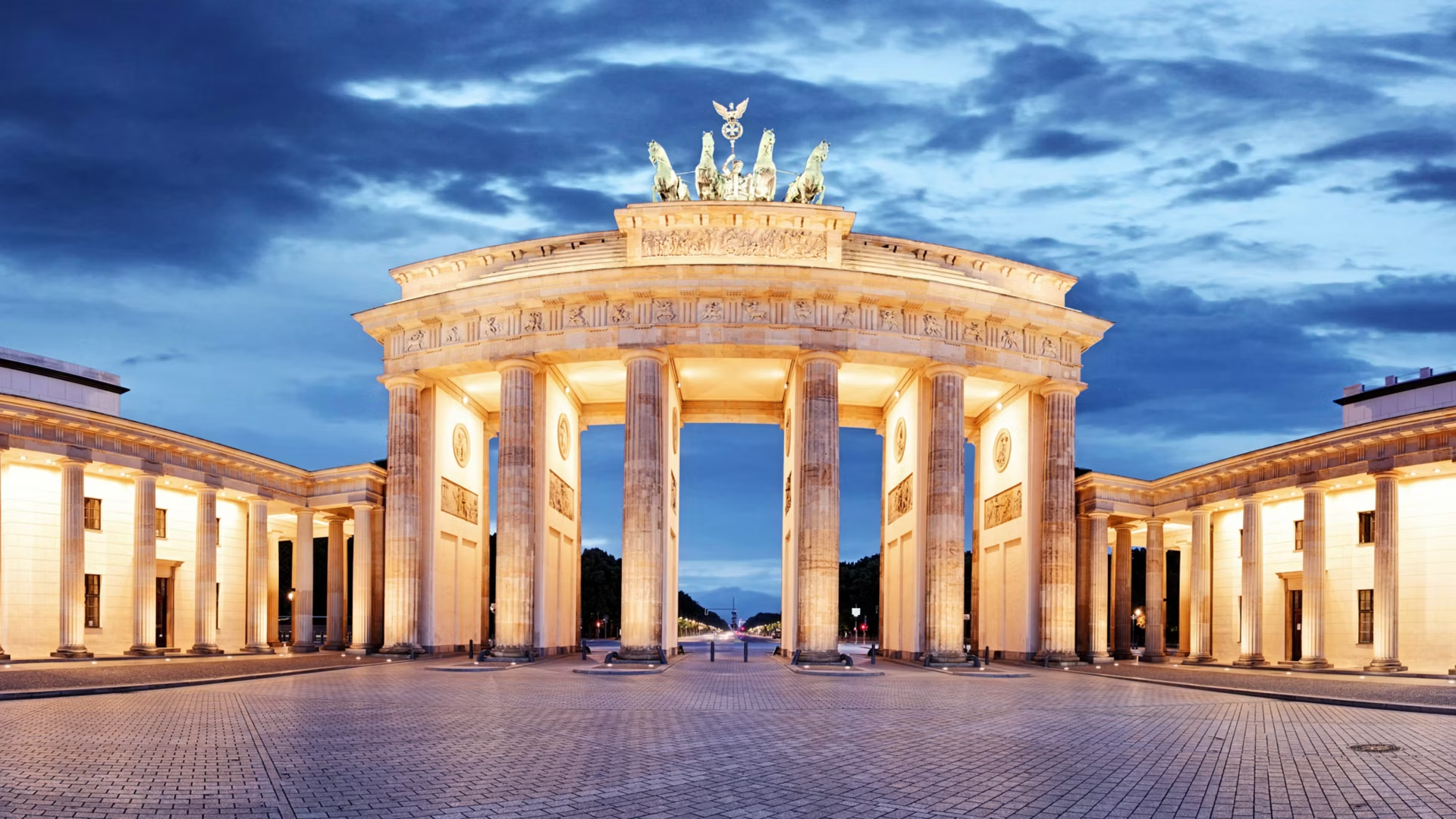 berlin.avif (source: voyagesautenteo.com)
berlin.avif (source: voyagesautenteo.com)The Undisputed Reference of the Techno Scene
No list of European party destinations would be complete without Berlin. This city, which literally never sleeps, has built a worldwide reputation for its incomparable techno scene. The weekend starts on Friday and ends... the following Tuesday for the most determined.
The Friedrichshain-Kreuzberg district constitutes the epicenter of this nocturnal effervescence with emblematic clubs that have defined global clubbing culture. At the top of the list, the mythical Berghain, installed in a former power plant, is considered the world cathedral of techno. Its selective entrance policy is as legendary as its musical marathons that extend over several days.
Not far away, Watergate offers a breathtaking view of the Spree, while Tresor, nestled in a former heating depot, offers an authentic underground experience. For a more offbeat atmosphere, head to Sisyphos, a former industrial complex transformed into a surrealistic playground.
Beyond Clubs: A Diverse Nightlife Culture
Berlin's nightlife is not limited to techno clubs. The Neukölln district is filled with creative cocktail bars and alternative artistic spaces. For those who prefer a more relaxed atmosphere, the city's numerous beer gardens offer a typically German experience.
What makes Berlin unique is this freedom of expression that transcends all aspects of its nightlife. The city cultivates a spirit of openness and inclusivity that attracts partygoers from around the world. Traditional rules don't exist here - parties start late (rarely before midnight) and end... when they end.
Good to know: The average cost of club entry varies between €10 and €20, while a beer generally costs between €3.50 and €5 depending on the establishment.
Ibiza: The Island of Endless Nights
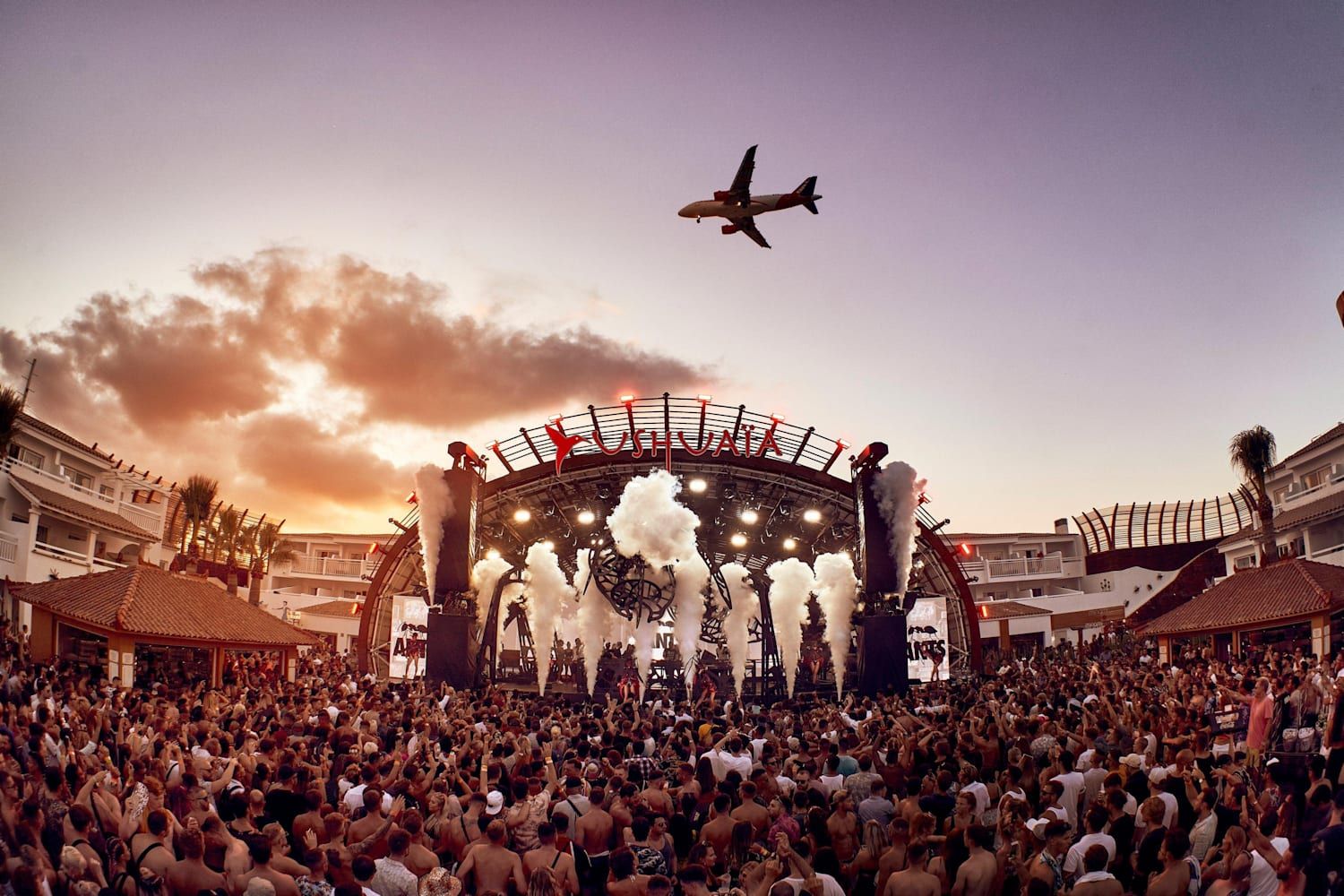 ibiza.jpeg (source: electro-news.eu)
ibiza.jpeg (source: electro-news.eu)The Mediterranean Paradise for Clubbers
If Berlin is the techno capital, Ibiza reigns supreme on the electro and house scene. Since the 80s, this Balearic island has transformed into a reference destination for party lovers from around the world.
Ibiza's superclubs have become legendary. The imposing Privilege, recognized as the largest club in the world with a capacity of 10,000 people, offers an outsized experience. The Pacha, with its emblematic cherries and themed parties, has represented festive elegance since 1973. Amnesia and its famous "moment of mist" when dawn peeks through the glass roofs remains an essential ritual. Not to forget Ushuaïa, a temple of daytime pool parties that transforms into an open-air club at sunset.
Ibiza's party season officially extends from May to October, with a peak intensity in July and August. It's during this period that the biggest international DJs take up residence in the island's clubs for weekly themed parties that have become cult favorites.
Between Daytime Beaches and Nighttime Clubs
The magic of Ibiza lies in this perfect alternation between daytime relaxation and nighttime frenzy. Beach clubs like Blue Marlin or Bora Bora allow you to extend the festive experience from sunrise to sunset.
For an authentic experience, sunsets at Café del Mar or Café Mambo in San Antonio represent an almost mystical ritual, blending ambient music, cocktails, and a dazzling natural spectacle.
Note: The budget necessary to fully enjoy Ibiza is substantial. Club entries range between €40 and €80, while a cocktail costs on average €15 to €20. It is strongly recommended to book in advance for the major clubs during high season.
Prague: The Eastern Pearl with Underground Nights
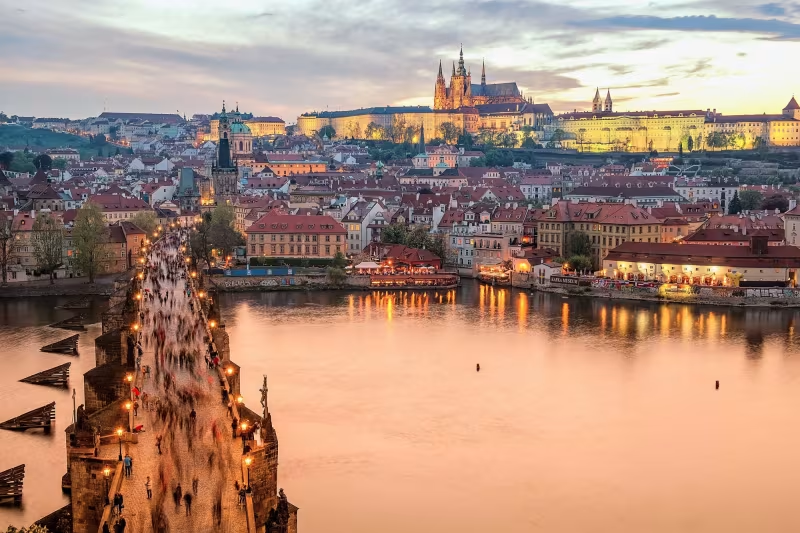 prague.avif (source: www.vacancesbleues.fr)
prague.avif (source: www.vacancesbleues.fr)The Bohemian Charm of Czech Nights
Prague, with its medieval architecture and romantic atmosphere, hides behind its historic facades a dynamic and particularly affordable nightlife. The Czech capital offers a unique mix of underground clubs, traditional bars, and alternative cultural spaces.
The Vinohrady district concentrates a large part of Prague's nightlife with establishments such as SaSaZu, an immense festive complex with Asian influences, or the Lucerna Music Bar which offers an eclectic program in an art nouveau setting. The Cross Club, with its industrial and mechanical decorations, perfectly represents the alternative spirit of the city.
For electronic music lovers, Roxy remains an essential institution, while Epic seduces with its futuristic design and house and techno parties.
Beyond Clubs: The Authentic Experience
What distinguishes Prague from other European party capitals is this authenticity that persists despite the tourist influx. The "pivnice" (traditional breweries) offer immersion in local culture with their incomparable beer at prices that defy all competition - count about €1.50 for an excellent Czech beer.
The Žižkov district, nicknamed the "Prague Montmartre," hosts the highest concentration of bars per inhabitant in Europe. It's the ideal place to live a more authentic nightlife experience, far from traditional tourist circuits.
Budget advantage: Prague remains one of the most affordable party destinations in Europe. Entry to most clubs costs between €5 and €15, while drinks are significantly cheaper than in Western capitals.
Amsterdam: Between Techno and Cozy Ambiance
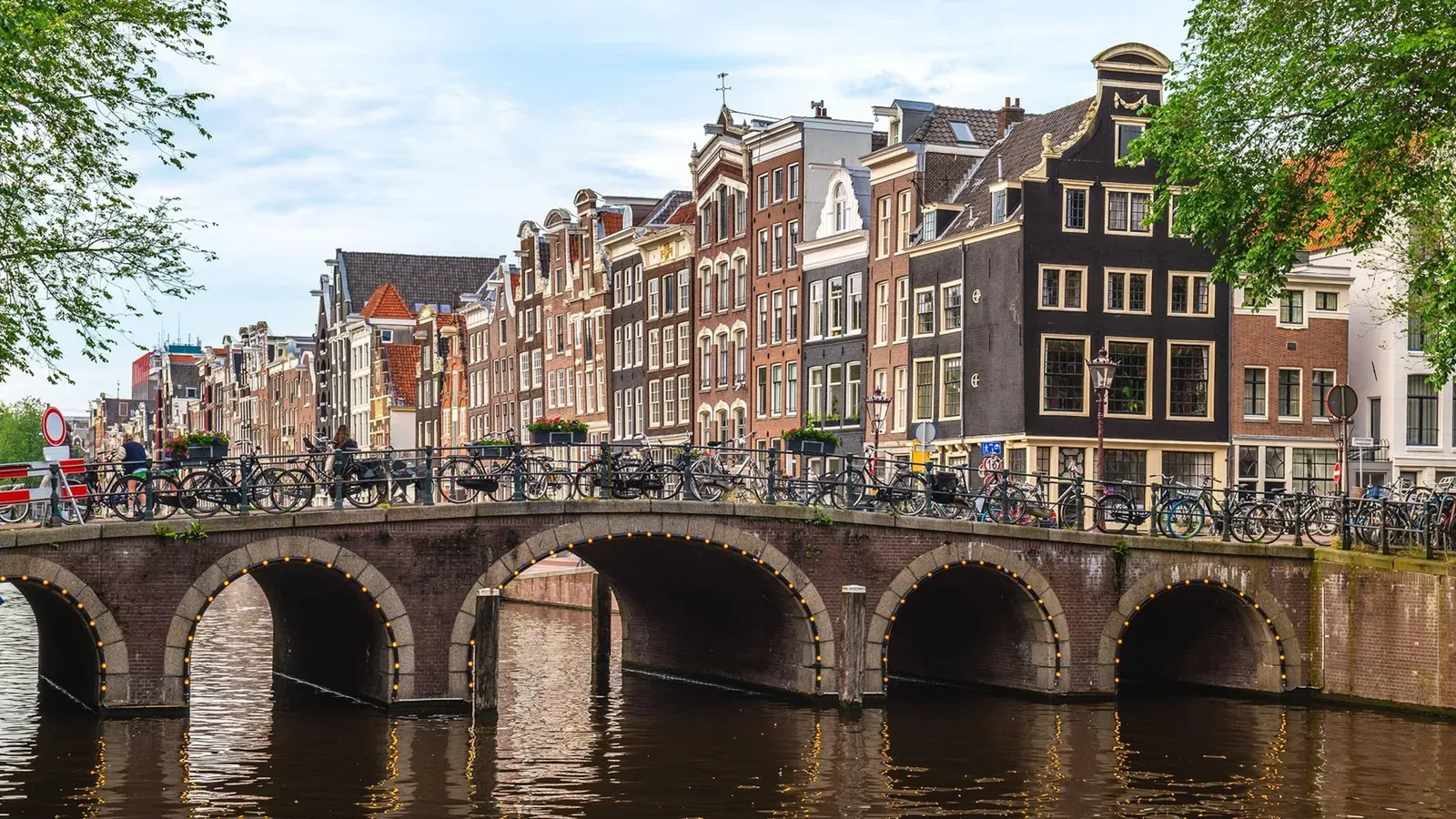 amsterdam.webp (source: www.nationalgeographic.fr)
amsterdam.webp (source: www.nationalgeographic.fr)The Dutch Capital with Multiple Facets
Amsterdam offers a nightlife as diverse as its canals are numerous. The city skillfully combines a cutting-edge electronic scene, traditional brown cafés, and an avant-garde festive culture.
The Rembrandtplein district constitutes the beating heart of Amsterdam's night with emblematic clubs like Escape or Club AIR. For more specialized electronic music lovers, head to De School, installed in a former technical school, or Shelter, nestled under a tower in the north of the city.
The Amsterdam Dance Event (ADE), held every year in October, transforms the entire city into a global epicenter of electronic music with more than 1,000 events spread over five days in nearly 200 venues.
A Diversity of Atmospheres
What characterizes Amsterdam is this multitude of atmospheres available in a single evening. The Red Light District offers a lively tourist ambiance, while the Jordaan seduces with its traditional brown cafés with warm and convivial interiors.
The "brown cafés," these traditional Dutch pubs with wooden interiors patinated by time, offer an authentic alternative to clubs. They derive their name from their walls browned by decades of cigarette smoke and offer an impressive selection of local beers.
Cultural tip: Many museums like the Van Gogh Museum or the Rijksmuseum regularly organize festive night events, blending art, music, and cocktails in an exceptional setting.
Budapest: Ruin Bars and Unique Atmosphere
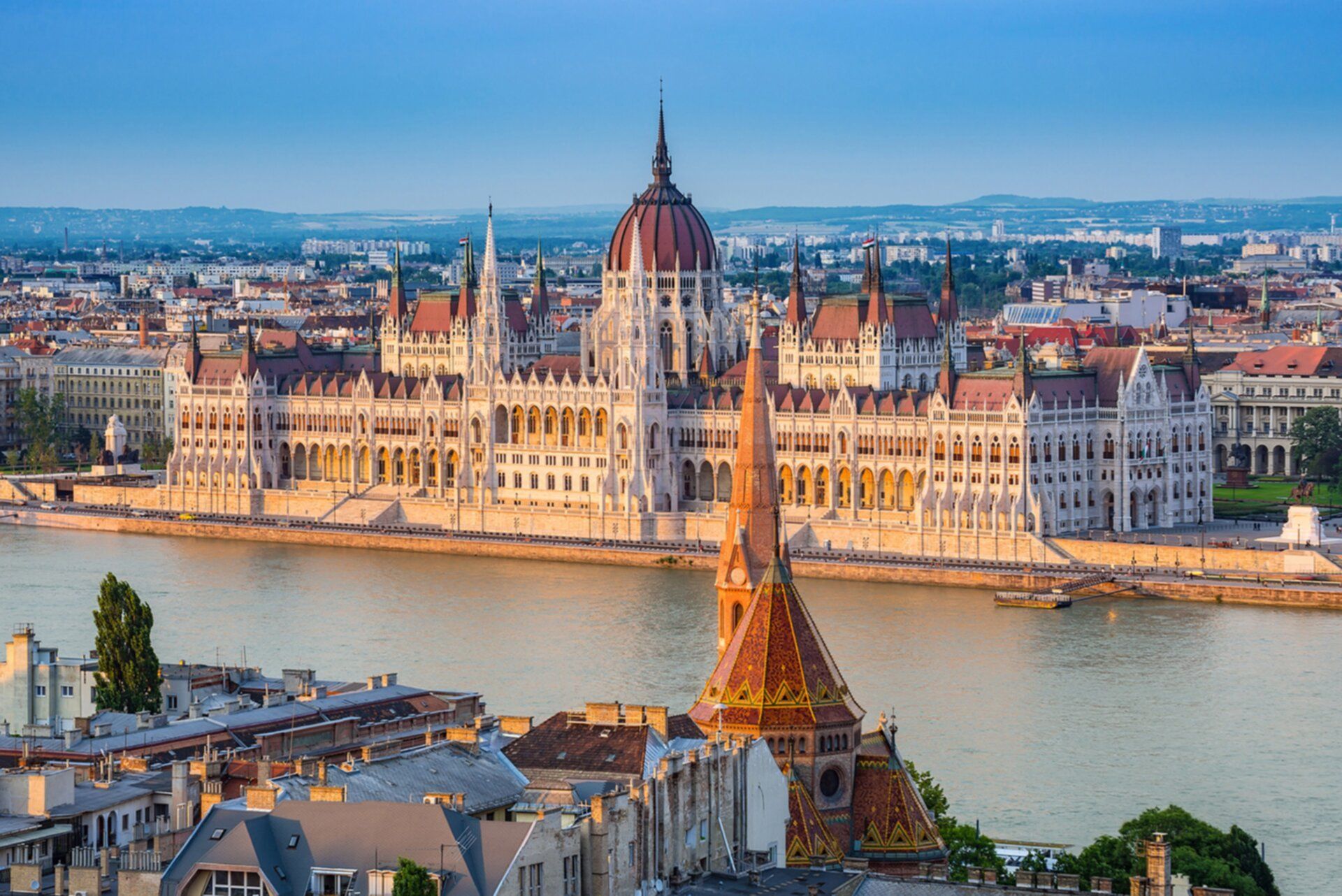 budapest.jpg (source: www.routard.com)
budapest.jpg (source: www.routard.com)Ruin Bars: Hungarian Festive Innovation
Budapest has revolutionized the concept of nightlife with its famous "ruin bars." Appearing in the early 2000s in the dilapidated Jewish quarter, these establishments occupy former abandoned buildings transformed into eclectic festive spaces.
Szimpla Kert, a pioneer of the genre, remains the most emblematic example with its maze of rooms decorated with recovered objects, vintage furniture, and improbable works of art. Other must-visit places like Instant (the largest ruin bar in the city) or Anker't perpetuate this unique tradition blending bar, art gallery, and cultural space.
For a more upscale experience, head to rooftop bars like High Note SkyBar or Aria Hotel, which offer a breathtaking view of the Danube and the illuminated Parliament.
Nocturnal Thermal Baths: A Local Specialty
One of the most original nocturnal experiences in Budapest? The "sparties" (spa parties) organized in the city's famous thermal baths. Every Saturday night, the Széchenyi Baths transform into a gigantic open-air club where people dance in 38°C water, surrounded by neo-baroque architecture and psychedelic light shows.
The Gozsdu Udvar (Gozsdu Court) district also constitutes an essential part of Budapest nightlife with its succession of bars, restaurants, and clubs installed in a series of rehabilitated inner courtyards.
Economic asset: With a cost of living significantly lower than in Western European capitals, Budapest allows you to enjoy a complete festive night for a modest budget. A pint of local beer costs about €2 to €3, while entry to most ruin bars is free.
Comparison of European Party Destinations
To help you plan your next European nightlife getaway, here's a comparative table of the main party destinations:
| City | Average Club Entry Cost | Average Beer Price | Best Period | Specificity |
|---|---|---|---|---|
| Berlin | €10 - €20 | €3.50 - €5 | All year | Techno clubs, marathon parties |
| Ibiza | €40 - €80 | €8 - €12 | May to October | Superclubs, star DJs, beach parties |
| Prague | €5 - €15 | €1.5 - €3 | April to October | Authentic ambiance, affordable prices |
| Amsterdam | €15 - €25 | €4 - €6 | All year (ADE in October) | Diversity of atmospheres |
| Budapest | €0 - €10 | €2 - €3 | March to October | Ruin bars, sparties |
Current Trends in European Nightlife
Urban Festivals: Partying Reinvents Itself
The boundary between club and festival is gradually blurring with the emergence of urban festivals that transform entire neighborhoods into celebration spaces. Sónar in Barcelona, Nuits Sonores in Lyon, or Dekmantel in Amsterdam perfectly illustrate this trend that combines specialized musical programming and immersive urban experience.
These events no longer content themselves with lining up DJs on a stage - they offer artistic performances, interactive installations, and conferences that enrich the traditional festive experience.
Return to the Authentic
Faced with the standardization of certain clubbing experiences, we observe a return to basics with the valorization of more intimate and authentic places. Micro-clubs and clandestine parties are experiencing renewed interest, particularly in cities like Lisbon or Naples that are emerging on the European party scene.
In Paris, recent regulatory developments have allowed the blossoming of a dynamic nightlife scene, with venues like Concrete (now closed but which inspired an entire generation of clubs) or La Station - Gare des Mines that offer demanding programming in atypical settings.
Inclusivity as a Fundamental Value
The best European nightspots now place inclusivity at the heart of their identity. Collectives like Room 4 Resistance in Berlin or Saoirse in London work to create safe and welcoming spaces for LGBTQ+ communities and minorities.
This trend is accompanied by a zero-tolerance policy towards inappropriate behaviors, with initiatives like "Ask for Angela" in British bars, which allows people feeling unsafe to discreetly ask staff for help.
Practical Advice for a Successful European Night
Safety and Precautions
Despite the festive atmosphere, some precautions remain essential to fully enjoy your European evenings:
- Research neighborhoods to avoid, particularly at the end of the evening
- Keep a copy of your ID documents separate from the original
- Watch your drinks and remain vigilant against date rape drugs
- Plan your return journey before going out (last metro, taxi, etc.)
- Keep a power bank for your phone
In large metropolises like Berlin or Amsterdam, public transport often operates 24/7 on weekends, offering a safe and economical alternative to taxis.
Dress Codes and Local Specificities
Each destination has its own codes that should be known to optimize your chances of accessing the most selective establishments:
- Berlin: favor a minimalist look, often black, and avoid anything that appears too "touristy" or flashy
- Ibiza: style varies according to clubs - chic outfit for Pacha or Ushuaïa, more casual for Amnesia
- Prague: few dress requirements, the atmosphere remains globally relaxed
- Amsterdam: casual attire accepted in most places, except exceptions like Jimmy Woo
- Budapest: very flexible, the important thing is practicality to enjoy the ruin bars with their multiple nooks
Reservations and Planning
To optimize your European nightlife experience, some planning advice is essential:
- Book your club entries in advance, particularly in Ibiza during high season
- Arrive early to avoid endless queues
- Consult local cultural agendas to discover special events
- Use dedicated apps like Resident Advisor or Xceed to stay informed
- Don't hesitate to ask locals for advice to discover less touristy places
Budget tip: Prioritize "predrinking" (consuming before going out) to reduce your expenses, particularly in expensive destinations like Ibiza.
Conclusion: The Richness of European Nightlife Diversity
Europe offers a festive panorama of incomparable richness. From Berlin techno to Budapest ruin bars, to Ibizan superclubs, each destination cultivates its own nocturnal identity, reflecting its history and culture.
This diversity constitutes precisely the main attraction of the continent for nightlife lovers: it is possible to live radically different experiences just a few hours' flight apart. A long weekend is often enough to immerse yourself in the unique atmosphere of a European party capital.
Nightlife is not just a simple succession of clubs and bars - it represents a true living cultural heritage that continues to evolve and innovate. So, what will be your next destination for an immersion in European nights?
Don't forget that booking club or festival entries can considerably facilitate your experience. To quickly access the best establishments without queuing, Tonight Pass offers a simple and effective solution - book your entries in a few clicks from your couch!
Share your own European party experiences or ask your questions in the comments below!
Tonight Pass, the go-to platform for club and party enthusiasts, ensures a fast and reliable experience, allowing party-goers to fully enjoy each celebration and meet new people at the heart of the wildest events.